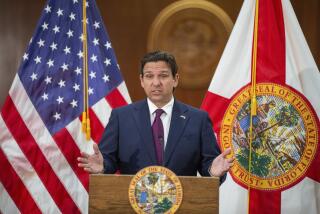Guidelines Offered for School Religion Clubs
- Share via
WASHINGTON — Although some vehemently opposed the law, 21 national educational and religious groups released guidelines this week to help schools abide by the Equal Access Act allowing high school religion clubs.
Oliver Thomas of the Baptist Joint Committee and Charles Haynes, president of the National Council on Religion and Public Education, described the guidelines as a consensus reached over four months.
The Supreme Court last summer said students do have the right to form religion clubs if extracurricular clubs are allowed in their school. Congress in 1984 called for such equal access but many schools circumvented it.
Haynes stressed that the law provides for equal, not preferential, treatment for religious speech; protects only student-initiated religious groups, and does not limit the authority of the school to maintain order and discipline.
Past judicial decisions on school prayers were unaffected by the court, he said.
“These guidelines will not solve all the problems facing vital religiosity in public institutions,” said James Dunn of the Baptist Joint Committee. “They will not provide the last word in the American experiment regarding church and state. They will not be equally welcomed across the land.
“However, they do provide a civil and civilized basis for discussion and debate,” Dunn said.
Using a question-and-answer format, the 16-page booklet discusses events triggering the law and answers such questions as when can student groups meet, whether teachers may be present during the meetings and whether outsiders may attend.
For example, the booklet says schools must allow religion and Bible groups to meet before or after school if it allows a scuba club, a stamp-collecting club and a service club. The groups are defined as “non-curriculum-related student groups.”
But a French club could be allowed without having Bible clubs because it would directly relate to the curriculum if a school taught French in a regularly offered course or planned to teach the subject in the near future.
“It should be noted, as a matter of record, that the National School Boards Assn. did not support enactment of the act and, indeed, challenged its constitutionality before the Supreme Court,” said August Steinhilber of the National School Boards Assn.
But Steinhilber said the association has a responsibility to conform with federal law and provide guidance to local school boards and administrators.
“All sides of the issue will be best served, and problems minimized, when public secondary schools have a clear idea of how provisions of the act affect their development of policies with respect to student groups,” said Mark Pelavin of the American Jewish Congress, which also opposed the law.
Officials said the guidelines will be distributed to every public high school principal in the nation, and will be made available to school boards, teachers, parents and religious groups.
More to Read
Sign up for Essential California
The most important California stories and recommendations in your inbox every morning.
You may occasionally receive promotional content from the Los Angeles Times.










